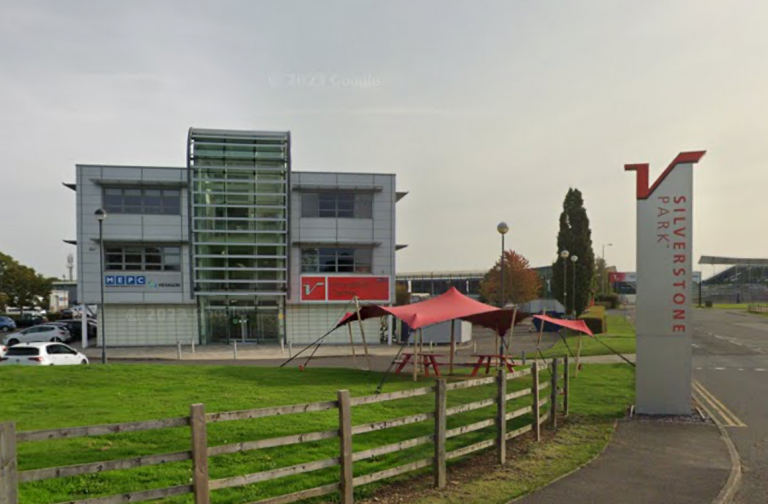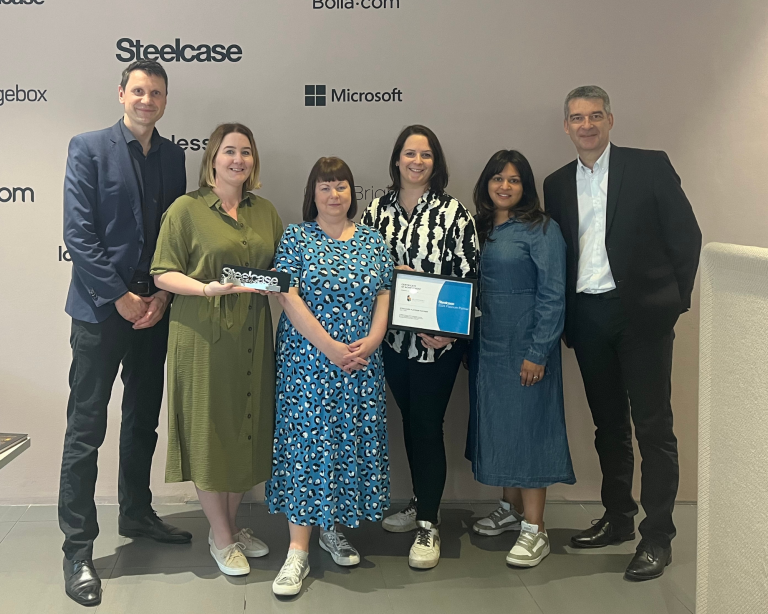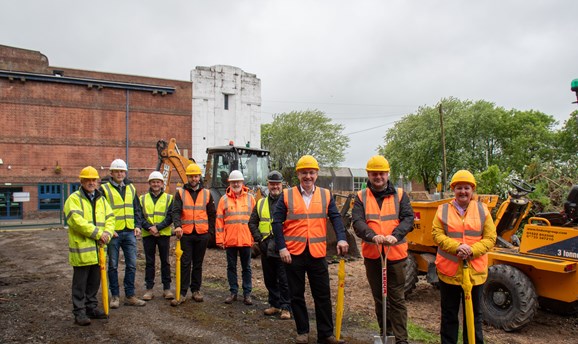Sunday, June 15, 2025
Professional services group Gateley has promoted eleven people in its Nottingham office.
Charlie Jakeman has been promoted to partner within the construction team, having joined Gateley as a legal director in 2021, while Tertia Werry and Janine Gibbs have been promoted to legal director in the real estate and private client teams respectively.
Those promoted to senior associate are Nathan Allaway from the real estate team, Rebecca Sells from the planning team, Rachael Mitchison from the corporate team, Alicia Bradburn from the banking team and Katherine Wright from Adamson Jones, the dedicated patent and trademark practice.
Additionally, three of the Nottingham team have been promoted to associate; Jaclyn Nelson and Catherine Everington who are both from the construction team, and Shiv Nand from the banking team.
Andrew Macmillan, partner and head of Gateley’s Nottingham office, said: “I’m extremely proud to see so many of our talented employees in Nottingham achieve promotions this year. They have all shown a great level of commitment to achieving outstanding results for our clients and deservedly have been rewarded for their work.
“These promotions highlight Gateley’s continued commitment to the development of our employees and having so many promotions in our Nottingham team shows just how well our city is doing at attracting and retaining top talent.”
Leicestershire Business Voice (LBV), the voice for local businesses, has appointed Sean Jarvis as its newest board member. Sean is Chief Executive of Leicestershire County Cricket Club and joins nine other members on the LBV board.
Sean brings over 30 years’ experience in business and sports administration to his new role. He and the LBV board are responsible for offering an independent and collective voice to represent the local business community through engagements with other key local stakeholders, the public sector and regional bodies. It also provides members with a regular programme of business-themed events and debates.
Sean has been Chief Executive of Leicestershire County Cricket Club since June 2020, where he is responsible for delivering the strategic plan for the club.
Prior to this role, Sean was a Director of Huddersfield Town Football Club and Trustee of the Town Foundation, the official charity of Huddersfield Town FC. He was also a Director of Huddersfield Canalside, the training ground for Huddersfield Town FC and Chairman of Place To Make It, a group of local business owners who promoted Huddersfield.
Sean was the Owner/Marketing Director of Oldham Athletic FC and started his career as a Director of GSM, a marketing agency in Leeds, with a focus on sports clients.
Commenting on his new role, Sean Jarvis said: “I was born and bred in Leicester and although I’ve worked away from the city for much of my career, my connection to Leicestershire is very important to me, so I’m happy to give back through my new role with LBV.
“I’m keen to develop the brand of Leicester and Leicestershire, nationally and internationally, and build on the Cricket Club’s position as part of the fabric of the local business community.
“LBV is well established and respected, and I see it as a primary vehicle to help local businesses to continue to improve. I’m looking forward to helping the board with its collaborations with, and lobbying of, local and regional influential stakeholder organisations.
“I’m particularly keen to see work around infrastructure improvements, developing links between education and business, growing international investment and of course, celebrating the sporting heritage of the city!”
Robin Pointon, Chair of LBV, added: “We’re delighted to welcome Sean to the board of LBV. We’re committed to representing and being a voice for a broad cross-section of businesses in the city and county. Sean’s role at the Cricket Club, his background, vision and ideas will provide us with a new perspective to add to our support for the local business community.”
The role of an executive has transformed dramatically in recent years. Gone are the days when being at the helm meant merely delegating tasks and overseeing operations. Today, the modern marketplace demands a leader who is adept at not only managing but also inspiring, innovating, and steering their team through the complexities of the contemporary business environment.
Embracing agility and flexibility
One of the crucial skills that today’s leaders need to possess is agility. The ability to pivot and adapt to rapid changes is what separates the wheat from the chaff.
In industries where new technologies and business models are continuously emerging, an agile leader can foresee potential disruptions and harness them to their advantage, ensuring their organisation not only survives but thrives.
This agility goes hand in hand with flexibility. Leaders must be prepared to discard old systems and beliefs that no longer serve their purpose. It’s about having an open mind and a willingness to embrace new ideas and approaches, even if they challenge traditional norms.
Mastering emotional intelligence
Another indispensable skill in the modern executive’s toolkit is emotional intelligence. This goes beyond simply understanding one’s emotions; it involves recognising the emotional cues of others and using this understanding to foster strong relationships within the team. Emotional intelligence helps leaders manage stress, conflict, and the demands of leadership roles, ensuring they lead their teams with empathy and understanding.
This skill also extends to how executives handle customer relationships. In today’s customer-centric business world, understanding and predicting customer behaviour can make or break a company.
Championing innovation and continuous learning
Innovation is the buzzword in almost every industry, but it’s not just about creating new products or technologies. It’s about cultivating a mindset that embraces continuous improvement and learning. Leaders must encourage their teams not just to accept change but to drive it. This involves a commitment to learning, both at the individual and organisational levels.
St Mary’s University, for instance, offers online MBA programmes that help promote strategic leadership and innovative thinking, equipping leaders with the knowledge to stay relevant and effective in their roles.
Fostering collaboration and inclusivity
The modern workplace is diverse, and successful leaders are those who can harness this diversity to foster innovation and creativity. This requires creating an inclusive environment where all voices are heard and valued. It’s not merely about meeting diversity quotas; it’s about integrating diverse perspectives into the business strategy to enhance decision-making and problem-solving.
Collaboration is equally essential. In a complex business environment, no single person holds all the answers. Effective leaders build networks of cooperation across and beyond the organisation. They break down silos, encourage cross-functional teams, and ensure that collaboration is part of the company’s DNA.
Leading with integrity and purpose
Finally, perhaps the most significant attribute of a successful modern leader is integrity. In an age where every corporate move is scrutinised, leaders must act with honesty and uphold strong ethical standards. This builds trust and respect, which are critical for long-term success.
In conclusion, leadership in the modern marketplace is multifaceted and challenging. It requires a blend of traditional skills and new competencies that align with the dynamic demands of today’s global business environment. Embracing these skills enables today’s executives to lead their organisations to new heights of success.
Formtech Machining UK, part of Formula 1’s manufacturing supply chain, is planning to significantly increase the size of its operations at Silverstone Park.
The company specialises in producing niche, precision metallic components for F1 teams.
Currently it employs ten people – chiefly CNC machinists and programmers – inside its Silverstone Park workshop/factory premises which total 12,300 sq ft.
Its manufacturing capabilities are also relied on by customers in automotive and marine.
In the last six months Formtech has invested over £2m in state-of-the-art equipment including two significant GF Mikron machines – a P800US with robot assisted 16 pallet loader and a P500 with seven-pallet rotary loader.
“There is a growing demand for our services from F1,” explained Formtech Director Mark White, former Operations Director at the Aston Martin F1 team. “We’re building ourselves a name as a reliable partner for teams with healthy repeat custom.
“Some of our robotic equipment is better even than some of the F1 teams we work with which means we can do the work more efficiently to meet our customers’ demands.”
He added: “We have good relationships with a number of neighbouring businesses at Silverstone Park who have their own specific engineering or manufacturing skills. We can complement each other collaboratively and it’s one of the reasons we’re at Silverstone Park.
“The area is also rich in manufacturing skills which helps us with recruitment and the Park’s central location puts us within half an hour’s drive time of at least five of the F1 teams. It’s ideal for logistics.”
Formtech Machining UK is owned by former GP2 Series race team boss Franz Hilmer’s Formtech GmbH Werkzeug in Germany which specialises in tooling and moulding.
Mark continued: “The UK arm was founded in 2019, initially in a partnership with Aston Martin (then Racing Point), but we are now wholly independent and are supplying various teams on the F1 grid and are in discussions with more.
“Our work in automotive and marine is also interesting and there is scope for us to start looking now at aerospace. We have growth ambitions and would like to expand to double the size and output in the next 12-18 months.”
A quest to rid an Erewash town of a major eyesore has taken a leap forward – with an announcement by the borough council that it has bought Long Eaton’s derelict Galaxy cinema.
The news – which follows painstaking negotiations – avoids a long drawn-out compulsory purchase as the authority drives forward levelling-up investment of £25million in the town.
The council revealed it has also acquired the former Stage One nightclub – clearing the way for a wholesale regeneration of what is known as Galaxy Row.
Both buildings are poised to be bulldozed as part of Long Eaton’s “Town Deal” – which is cash that Erewash Borough Council helped secure from the government.
The demolitions will see smart new homes and commercial units built on the prominent Derby Road site. The plan is for three business premises plus 16 flats and four townhouses. There will be 28 parking spaces, which will be accessed from Oxford Street at the rear of the development.
The council is currently actively seeking a development partner for the scheme. The decrepit cinema has blighted Long Eaton since closing more than a decade ago. Planners said: “No proposals for re-use have come forward in ten years. It does not lend itself to a conversion to an alternative use.
“Given the apparent lack of developer interest and limitations of the former cinema for its reuse and the poor current appearance of the building, the loss of the building is considered acceptable.”
A £10million refurbishment of the High Street is looming. Richard Ledger, who is chairman of the Long Eaton Town Deal Board, welcomed the purchase of the cinema and nightclub. The local businessman, who studied physics with Stephen Hawking at Cambridge, said: “Long Eaton will be reinvigorated under the Town Deal – becoming an increasingly vibrant place to live and work.
“I would like to thank not only the council but also the people of Long Eaton who along with local businesses have been backing the campaign to unleash the town’s potential.”
Erewash councillor Curtis Howard, who is Lead Member for Town Centres, Regeneration and Planning, said of the authority’s acquisitions: “This is a vital step toward finally getting spades in the ground on one of our most important levelling-up projects. Once completed, the new Galaxy Row development will provide new and modern commercial space for local businesses, and much needed, high-quality new homes.
“With this and proposals for the £10million High Street upgrade now well underway, we are ambitious for the future of Long Eaton town centre. This proves it.”
PDS Ltd, a technology solutions provider, is participating in the Three Peaks Challenge on Sunday 23rd June, as part of its ongoing commitment to corporate social responsibility.
The Yorkshire Three Peaks Challenge is an intense and rewarding endeavour that involves climbing Pen-y-Ghent (694 metres), Whernside (736 metres) and Ingleborough (723 metres) respectively. These hills form a part of the Pennine range, and the walk will be completed in under 12 hours.
The PDS team embark on this rigorous journey to raise funds for YMCA Derbyshire’s Foundry Point, a vital initiative that provides affordable housing for young people entering work or on low wages.
These flats will need to be furnished with white goods, Wi-Fi, furniture, flooring and blinds. The funds raised during this event will go towards buying these essentials.
Nathan Lawson, Managing Director at PDS Ltd, said: “We are excited to take on the Yorkshire Three Peaks Challenge and support a cause as impactful as the YMCA Derbyshire’s Foundry Point scheme. Our fundraising target is £2,500 and PDS Ltd will match this.
“Our team is motivated to not only meet the physical demands of the challenge but also to raise significant funds to help kit out the new flats at Foundry Point. We are passionate about giving young people the best start in life.”
The company has set up a fundraising page to collect donations for the challenge and would be extremely grateful for any support of this important cause by donating and cheering on the team as they undertake this formidable challenge.
For more information about the Yorkshire Three Peaks Challenge and how you can support PDS Ltd’s fundraising efforts for YMCA Derbyshire, please visit https://www.justgiving.com/page/pds-1708511950094.
Blueprint Interiors, a Midlands-based workplace consultancy and commercial office fit-out specialist, has been awarded Steelcase Platinum Partner status for the second year running.
This achievement places Blueprint Interiors among an elite group of just four Platinum Partners recognised in the UK for 2024.
“We are proud to receive this recognition from Steelcase for the second year,” says Gemma Ryder, Head of Furniture at Blueprint Interiors.
“Steelcase is a world-renowned leader in furniture, technology products, and architectural services designed to empower people. Their ethos of designing products to help people do their best work in the many places where work happens directly aligns with our own, which is why our partnership is so successful.”
On awarding the trophy, Kris Newman, Senior Business Manager at Steelcase, said: “Our Platinum Partner programme recognises our Dealer Partners for not only for their commercial success, but also their alignment with our insight-driven approach to the office furniture industry.
“Blueprint Interiors exemplifies the qualities of a distinguished Steelcase Platinum Partner and working with the team has been an absolute joy. Their commitment to exceptional customer service and dedication to creating inspiring workspaces for their clients has been just one of many of the contributing factors to their continued success.”
Blueprint Interiors achieved this status by exceeding demanding criteria, including surpassing sales targets, demonstrating exceptional financial stability, and seamlessly integrating Steelcase co-branding requirements into their marketing and PR initiatives.
“We are incredibly grateful to our valued clients for their continued partnership, which has been instrumental in achieving this prestigious recognition,” adds Ryder. “We also extend our appreciation to Steelcase for supporting our dedication to delivering best-in-class experiences for all our clients.”
The team is looking forward to continuing its successful partnership with Steelcase and using this recognition to deliver even more innovative and people-centric workspace design solutions in the future.
Work has begun on the transformation of the derelict Fox Street, Sutton, into an event and market space.
Ashfield District Council plan to create a flexible outdoor space that links pedestrians from ASDA to the town centre, and can accommodate markets and events. The site is located behind Lloyds bank and is currently a disused wasteland. The transformative works will see a 41-space car park created with new lighting, CCTV and native trees and hedging planted to enhance biodiversity.
The river Idle, which runs through the back of the site, will be cleaned, and restored, providing a natural focal point. The works to Fox Street are being funded by Ashfield District Council’s £6.27 million Future High Streets Fund.
Councillor Jason Zadrozny, Leader of Ashfield District Council, said: “We can’t wait to see this project begin. The Fox Street site has been an eyesore for a long time and our renovation works will breathe life into it, creating a space that can be used for events and markets – capitalising on the natural footfall in this part of Sutton.
“Ashfield District Council’s plans for the entire District are revolutionary and will create a lasting impact on Ashfield; a great place to live, visit, work, and play.”
The next stage of the regeneration of Sutton town centre will start shortly after Fox Street, with ground being broken on Portland Square in June. The Council’s ambitious plans for Portland Square will create a modern, attractive, and useable town centre, funded as part of their £62.6 million Towns Deal.
The new-look Portland Square will feature two raised lawns with inbuilt seating, ambient lighting, planting and semi-mature trees to bring greenery back into the urban setting. Alongside the planters will be CCTV cameras, streetlighting, a new level flooring and more room outside businesses for outdoor seating.
Both sites are expected to be completed by the end of the year.
Lindum Group Managing Director Kevin Damarell said: “We are delighted to be continuing our partnership with the council through this scheme at Sutton in Ashfield.
“We’ve been working with the authority since mid-2023 to help find the most cost-effective way to deliver the works, which will make a huge difference to the town centre, and ultimately provide a much-needed boost to the local economy.”
Lindum will be calling on the expertise and skills of local businesses to deliver this project, including Townscape Products, based in Fulwood Road South, which is one the UK’s premier street furniture manufacturing companies.
Townscape Products Head of Sales, Jess Fergusson, said: “Townscape are very pleased to be working with Lindum Group and Ashfield Council to help realise this Town Centre improvement scheme.
“The raised platers and seating will provide a vibrant focal point for the local community enhancing the aesthetic appeal of the square and adding a much-needed green space for all to enjoy.’’
A scheme has been launched to support Charnwood businesses which are looking to reach new heights.
Charnwood’s Scale-Up programme is searching for companies which may benefit from business support to help them grow and expand.
It is being supported by the borough council using the Government’s UK Shared Prosperity Fund and is being delivered by specialist expert advisors, Exemplas.
Each business which takes part will be thoroughly assessed on its ambition, capacity and potential for growth, and will work one-to-one with an expert advisor to draw up a bespoke growth action plan.
Cllr Jenni Tillotson, the Council’s lead member for economy development, regeneration and town centres, said: “This scheme will help businesses which have ambitions to be bigger, better and more prosperous.
“The Scale-Up programme will help local companies take that next big step into growth. By supporting businesses like this, the Council is helping to create jobs and opportunities for people in the future and continue to make Charnwood a great place to do business and invest.”
Mark Taft, the programme’s dedicated Scale-Up Advisor, said: “I take great pride in working with ambitious SMEs and am excited about working closely with Charnwood’s business community to offer support and advice they can use to scale up.”
Companies can apply to be part of the Scale-Up programme via the Leicestershire Business Advice Service.
As there are limited places available on the programme, each business will be evaluated by a panel for suitability. If successful, the Scale-Up Advisor will undertake a comprehensive diagnostic with the business to establish their priorities, compose an action plan and agree a business improvement project.
This could include a grant contribution capped at a maximum of £1,000 to use to fund an expert to help remove the company’s barrier, accelerate business growth, and scale up their business.
Ensuring workplace safety compliance is crucial for any business. In 2024, staying up-to-date with safety regulations can protect employees and avoid legal issues. Here are practical tips to help maintain a safe and compliant workplace.
Regular safety training
Regular safety training is essential to keep all employees aware of current safety protocols. Training sessions should cover potential hazards, emergency procedures, and the proper use of safety equipment. Employees must understand how to report unsafe conditions and the importance of following safety guidelines.
Providing refresher courses is equally important. These sessions help reinforce safety practices and update employees on new regulations. Incorporating practical demonstrations can enhance understanding and retention of safety procedures.
Conduct routine inspections
Routine inspections are vital to identify and rectify potential hazards. Inspections should be thorough, covering all areas of the workplace. This includes checking equipment, ensuring exits are clear, and verifying that safety signs are visible and up-to-date.
Employers should document findings and take immediate action to address any issues. Regular inspections can prevent accidents and ensure compliance with safety regulations. It’s advisable to have a checklist to ensure nothing is overlooked during inspections.
Maintain equipment and infrastructure
Maintaining equipment and infrastructure is a key aspect of workplace safety. Regular maintenance checks can prevent equipment failure and reduce the risk of accidents. This includes inspecting machinery, electrical systems, and other critical infrastructure components.
For electrical safety, it’s important to know how long an EICR lasts. You can contact experts such as Hexo Electrical Testing to see how long an EICR lasts. An Electrical Installation Condition Report (EICR) typically lasts for five years for commercial properties. Regularly updating this report ensures compliance with safety standards.
Implement clear safety policies
Clear safety policies provide a framework for a safe working environment. These policies should outline procedures for handling hazardous materials, emergency response plans, and guidelines for safe working practices. Policies must be accessible to all employees and included in training sessions.
Regularly reviewing and updating these policies is crucial to adapt to new safety regulations and workplace changes. Employees should be encouraged to provide feedback on safety policies, which can help identify gaps and areas for improvement.
Foster a safety culture
Creating a safety culture in the workplace encourages employees to prioritise safety in all their activities. This culture starts with leadership. When management demonstrates a commitment to safety, employees are more likely to follow suit. Regularly communicating the importance of safety and recognising safe practices can reinforce this culture.
Encouraging open communication about safety concerns is also vital. Employees should feel comfortable reporting hazards or suggesting improvements without fear of reprisal. This proactive approach can help identify and mitigate risks before they lead to accidents.
Use technology for safety management
Leveraging technology can enhance workplace safety management. Safety management software can streamline the process of tracking incidents, conducting inspections, and maintaining records. These tools can provide real-time data and analytics to identify trends and areas needing attention.
Additionally, wearable technology, such as smart helmets and vests, can monitor workers’ health and safety in real-time. These devices can detect hazardous conditions, such as high levels of toxic gases, and alert both the worker and management immediately. Implementing such technologies can significantly reduce the risk of accidents and improve overall safety compliance.
Regularly review safety procedures
Regular reviews of safety procedures ensure they remain effective and compliant with current regulations. This involves assessing the efficacy of existing safety measures and making necessary adjustments. These reviews should consider any changes in the workplace, such as new equipment or processes, that might introduce new risks.
Involving employees in these reviews can provide valuable insights. Workers on the front lines often have firsthand knowledge of potential hazards and can offer practical suggestions for improvement. Regularly updating procedures based on these reviews helps maintain a safe working environment.
Ensure proper signage and labelling
Proper signage and labelling are crucial for maintaining safety compliance. Safety signs should be clearly visible and provide essential information about hazards, emergency exits, and safety equipment locations. Labelling hazardous materials with the correct warning symbols and handling instructions is also essential.
Signs and labels should be updated regularly to reflect any changes in safety procedures or workplace layout. Ensuring that all employees understand the meaning of different signs and labels can prevent accidents and improve response times in emergencies.
Ensure adequate personal protective equipment (PPE)
Providing adequate personal protective equipment (PPE) is a fundamental aspect of workplace safety. Employers must ensure that employees have access to the necessary PPE, such as gloves, masks, helmets, and safety glasses, depending on their job roles. It is also important to regularly inspect and replace PPE to ensure it remains effective.
Training employees on the proper use and maintenance of PPE is essential. They need to understand when and how to use each piece of equipment to protect themselves effectively. Ensuring compliance with PPE usage can significantly reduce the risk of injuries and illnesses in the workplace.












